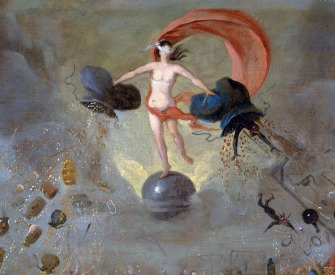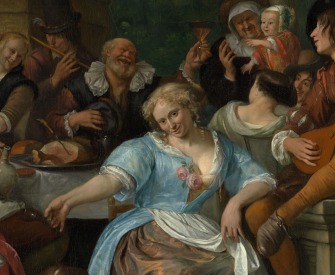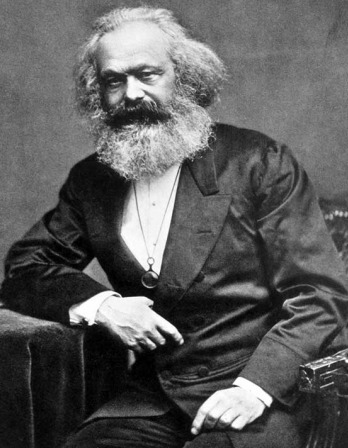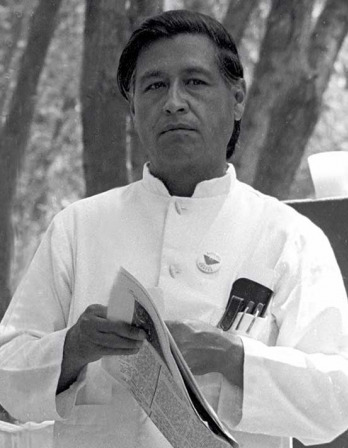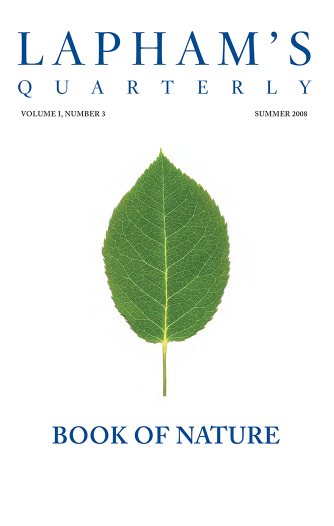In the first place God made idiots. This was for practice. Then he made school boards.
—Mark Twain, 1897Playing with Fire
The framework of American education holds fast to the ardent but mistaken belief that education is a commodity, the stuff that one pours into empty vessels.
By Lewis H. Lapham

A Young Man Being Introduced to the Seven Liberal Arts, by Sandro Botticelli, c. 1484. Louvre Museum, Paris, France.
The mind is not a vessel to be filled but a fire to be kindled.
—Plutarch
To bring up the subject of education in nearly any sector of the American conversation—after dinner or before breakfast, in print and en blog, via public television or private smartphone—is to invite an argument or endure a sermon. No subject strikes closer to the bone of the democratic idea, and whether standing at the bar or seated on the lawn, all present come armed with two invincible opinions:
1. America’s best, last, and only hope for the future rests with the promise of education.
2. The promise isn’t being kept.
No respondent is ever at a loss for a telling anecdote or an illuminating statistic—forty million functional illiterates in the country unable to read a road sign or a restaurant menu, one fifth of the adults polled unaware that the earth revolves around the sun, 28 percent of the nation’s college seniors believing that the American Revolution was won at the Battle of Gettysburg, the Oklahoma high school girl who thought that the Holocaust was a Jewish religious holiday. Witnesses for the prosecution have been bringing evidence of the crimes against the dream of reason for as long as I can remember, certainly since the National Commission on Excellence in Education noticed, in 1983, that the country’s classrooms were flooded with “a rising tide of mediocrity.” The waters apparently continue to rise, and it now seems that every six months another committee of alarmed businessmen issues a report complaining of the system’s failure to deliver “high-quality product to the infrastructure.” The managers of America’s money worry about foreign competition in the global markets, say that unless the kids settle down to their lessons, the United States could lose it all—the ball game and the farm, the Nobel Prizes as well as the aircraft carriers, the hedge funds, the Pizza Huts and the roof-garden real estate in Palm and Pebble Beach. Corroborating testimony appears at least once a week in the dispatches from inner-city school districts as well as in the communiqués from the seats of higher learning. In Houston and Detroit administrators of the No Child Left Behind program mention the scarcity of textbooks and the need for armed guards on the playground; professors of the eighteenth-century Enlightenment at Duke and Stanford remark on the loss of respect for Johann Wolfgang von Goethe and a lack of acquaintance with Voltaire, sure signs of cultural backsliding into the mists of Mordor.
Like everybody else in the country old enough to have flunked a math quiz, I can wish that test scores grew on trees; but schools serve the political and economic order in which they operate, and whether they deserve a passing or a failing grade begs the prior question asking what it is they’re supposed to teach. The answers change with time and circumstance. The curriculum proposed by Plato forbade the reading of poetry apt to “give a distorted image of the nature of the gods and heroes”; Castiglione offered instruction in “a certain nonchalance” likely to win the favor of a Medici prince or a Borgia duke;
John Milton believed “the end of learning” to be the knowledge and love of God. When Yale College in 1701 set itself up as a vessel of the true Puritan faith in the Connecticut wilderness, it undertook to supply the colony’s churches with an orthodox ministry, and to bestow upon its graduates the warrants of Christian character and spiritual worth. Thomas Jefferson in 1819 established the University of Virginia to develop “the reasoning faculties of our youth,” to improve in its nature what “was vicious and perverse” and by so doing to advance “the prosperity, the power, and the happiness of a nation.”
The mission statement accorded with the American regard for the intellect as a means of building a better mousetrap—the power of the imagination not to be trusted unless securely fixed to a scientific project or a financial speculation, if in its artistic expression it remains purely decorative: something that can be framed in gold leaf or played on a banjo. John Adams associated the arts with monarchy and superstition and hoped that they wouldn’t be encouraged in the new republic. Benjamin Franklin took a similar line. “To America,” he said, “one schoolmaster is worth a dozen poets, and the invention of a machine or the improvement of an implement is more important than a masterpiece of Raphael.”
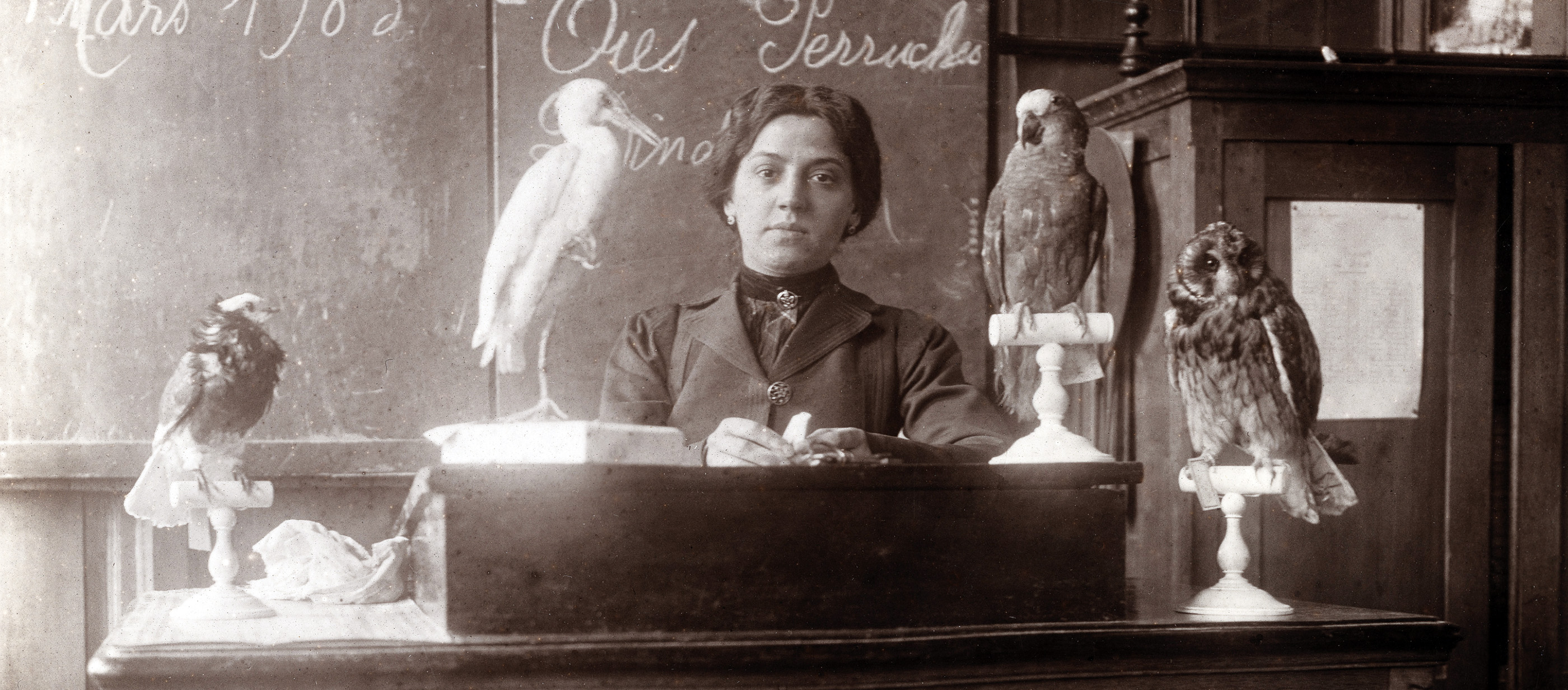
French teacher lectures about birds, 1903.
By the end of the nineteenth century the nation’s power and prosperity was emerging from its oil refineries and its steel mills, and the direction of America’s educational affairs passed from the hands of clergymen into those of the pedagogues in charge of the newly minted university bankrolled by the newly ordained ministers of industry and finance, among them John D. Rockefeller, James B. Duke, Ezra Cornell, Johns Hopkins, Andrew W. Mellon, Andrew Carnegie, and Cornelius Vanderbilt.
Addressing a meeting of the New York City High School Teachers Association in 1909, Woodrow Wilson, then president of Princeton University, set forth the requirements of America’s newborn industrial civilization. “We want one class of persons to have a liberal education,” he said, “and we want another class of persons, a very much larger class of necessity in every society, to forgo the privilege of a liberal education and fit themselves to perform specific manual tasks.” John Dewey in 1916 defined democracy as “primarily a mode of associated living,” and the schoolmasters of his generation cut the cloth of their teaching to the “needs and opportunities” of the prospective members of the national economic team, prepared to understand that what was great about America was the greatness of its gross domestic product, not the greatness of its love of liberty.
The revised purpose displaced Jefferson’s hope of a citizen schooled to the tasks of self-government and encouraged “to judge for himself what would secure or endanger his freedom.” Wilson as president of the United States in 1917 deleted the civics lesson with his promulgation of the Espionage Act, which marked as criminal any word or action unaligned with the imperative of “the national defense.” In April of that year the United States had entered World War I against the will and better judgment of 98 percent of the American people; for the duration of the war effort the Espionage Act served as the pretext for silencing any disloyal criticism of government policy. As a comfort and a means of political indoctrination for the American soldiers unclear as to why they were dying in the mud in France, the Wilson Administration’s propaganda office drummed up the course now known as “The Great Books,” the syllabus intended to transform the recruits bound for the Argonne Forest into what History Teachers Magazine called “thinking bayonets.”
The framework of American education set up at the outset of the twentieth century has proved itself well-fitted to the specifications of the national security state that at the end of World War II replaced what was once a democratic republic. Since 1965 we have invested upward of $25 trillion in public and private money to extend and adorn the educational infrastructure—splendid football stadiums; handsome libraries; clean and well-lighted scientific laboratories; programs for the gifted, the poor, the foolish, the outnumbered, and the inept—but the purpose of the enterprise remains much the same as it was in the good old days when Dink Stover was a freshman at Yale finding his way in 1910 to the tables down at Mory’s. Then as now, we hold fast to the ardent but mistaken belief that education is a commodity, the stuff that one pours into empty vessels—skill sets for the large class of persons destined “to perform specific manual tasks,” entry-level connections to Mammon for the much smaller class of persons en route to first-class accommodation in the society’s high-rent districts.
Students don’t go to school to acquire the wisdom of Solomon. They go to school to acquire a cash value and improve their lot, to pick up the keys to the kingdom stocked with the treasures to be found in a BMW showroom or an Arizona golf resort. Their education bears comparison to the procedure for changing caterpillars into silkworms just prior to their transformation into adult moths. Silkworms can be turned to a profit; moths blow around in the wind, and add nothing to the wealth of the corporation or the power of the state.
The objective conforms to the popular notion of democracy. As Americans, we make the heroic attempt to educate all our citizens, to provide as many people as possible with as many opportunities as possible, to do for our children what we couldn’t do for ourselves. The sentiment is as generous as it is romantic. Appreciated as a monument of idealistic intent, the American school system deserves to be ranked as the eighth wonder of the world. As long ago as 1931, Albert J. Nock, a critic otherwise as sarcastic as H.L. Mencken about the grade level of America’s public discourse, was moved to a feeling of awe. He described the country’s schools as “an expression... an organization—of a truly noble, selfless and affectionate desire.”
Unhappily—cf. the conversations gathered on the lawn or assembled in the bar—the desire is seldom fulfilled. Because the schools serve a political theory as well as an economic objective, they cannot afford to make invidious comparisons between the smart kids and the dumb kids. Under the rules of egalitarian procedure, the schools must teach everything to everybody (algebra and the novels of Jane Austen as well as the manipulation of the iPhone and the condom). Even more wonderful, they must entertain the fiction that everybody can learn to write as well as Jefferson or to think as clearly as René Descartes. Although a salve to the democratic conscience, the assumption makes a mockery of the facts. Who can imagine an NFL coach fielding his team to conform with social policy, or a major league baseball manager troubling himself with the niceties of affirmative action? College deans and high school principals don’t enjoy the same freedom of maneuver, and their obligatory disavowal of what they know to be true condemns the schools to a striving for the lowest plausible denominator.
Children learn by example as well as by precept, and they have only to surf the Internet or consider the careers of Paris Hilton and President George W. Bush to know that the making of a success in this American life doesn’t presuppose a prior knowledge of Dante’s Divine Comedy. The society doesn’t count on its statesmen or its movie stars to have read John Milton or George Eliot, and the corporations inclined to hire Harvard graduates don’t make important distinctions between those familiar with the essays of Michel de Montaigne and those who have mastered the complete works of Danielle Steele. If the kids know how to run the computers, work up the punch lines for Disney or Goldman Sachs, figure the exchange rates between the euro and the yen, what does it matter if they don’t know who won either the Revolutionary or the Civil War? It’s probably true that a very small percentage of high school students can point to Lithuania on a map; it’s also true that the State Department’s ambassadors often can’t speak the language of the country to which they buy passage with contributions to a presidential campaign. If a great many college students can’t diagram a sentence or write a decent paragraph, the same can be said of most American investment bankers and members of Congress. Should it become necessary to display the finery of learning, the congressman can hire an oil company lobbyist to write the legislation; the banker can order a bespoke set of attitudes from the tailors at the Aspen Institute or the Council on Foreign Relations.
The tide of mediocrity flows into the classroom from the ocean that is the society at large, and if many of our public schools resemble penal institutions, the students herded into overcrowded classrooms where they major in the art of boredom and the science of diminished expectations, how better to accustom them to the design specs of a society geared to the blind and insatiable consumption of mediocrity in all its political declensions and commercial conjugations—cf. the Bush Administration’s geopolitical theory at work in Iraq, the quality of the nation’s airline and fast-food service, corporate executives paid $20 million a year for performing the miracle of an $18 billion write-down. Why would any politician in his or her right mind wish to confront an informed citizenry capable of breaking down the campaign speeches into their subsets of supporting lies? Burden the economy with too many customers able to decipher the hospital bills, or see around the corners of the four-color advertising, and the consequences would be terrible to behold. Not even the Federal Reserve Bank could slow down the domino effect likely to shuffle through the entire inventory of the American dream. If much of what now passes for American education deadens the desire for learning (in both the downmarket public schools and the high-end private universities), so does much of what passes for entertainment in the nation’s film and television media. The United States now spends a good part of its fortune on narcotics—for pornography and alcohol as well as for drugs both illicit and prescribed. As a business proposition the war against the American intellect guarantees a more reliable rate of return than the War on Terror.
To conceive of an education as a commodity (as if it were a polo pony or an Armani suit) is to construe the idea of democracy as the freedom of a market instead of a freedom of the mind. I can understand why the mistake is both easy and convenient to make, but unless we stop telling ourselves that America is best understood as the sum of its gross domestic product, we stand little chance of re-imagining our history or reengineering our schools. The businessmen concerned about the quality of the domestic help might as well be talking about the operation of a fried chicken franchise or the manufacture of automobile tires—impose uniform rules and procedures, cut costs, teach the kitchen staff to speak English, upgrade the dress code, simplify the standardized tests, fry the chicken in whale oil instead of recycled bacon grease. In the uplands of the higher learning the custodians of Western civilization speak of moving Aristotle to the night shift and reconfiguring the library as a day care center. The recommendations don’t hold much promise of finding a phoenix in the ashes.
Education is a playing with fire, not a taxidermist’s stuffing of dead animals, and until we choose to acknowledge the difference between the two pedagogical techniques, we do ourselves no favors. Awaken the student to the light in his or her own mind, and the rest of it doesn’t matter—neither the curriculum nor the number of seats in the football stadium, neither the names of the American presidents nor the list of English kings. In college commencement speeches, as with the handing out of prizes for trendsetting journalism, I often hear it said that the truth shall make men free, but I notice that relatively few people know what the phrase means. The truth isn’t about the receipt of the diploma or acceptance into law school, not even about the thievery in Washington or the late-breaking scandal in Hollywood. It’s synonymous with the courage derived from the habit of not running a con game on the unique and specific temper of one’s own mind. What makes men and women free is learning to trust their own thought, possess their own history, speak in their own voices. It doesn’t matter how or when the mind achieves the spark of ignition—in an old book or a new video game, from a teacher encountered by accident in graduate or grammar school, in the course of dissecting a frog or pruning an apple tree, while looking at a painting by Jan Vermeer or listening to the Beatles sing “A Hard Day’s Night.”
Neuroscientists remark on the sensation of joy produced by the chemicals in the brain when the mind is being put to creative and imaginative use, a phenomenon they associate both with the pleasure of sexual orgasm and with the endorphin high experienced by athletes in the zones of effortless performance. The observation supports Plutarch’s hypothesis at the head of this essay, stands confirmed by the experiments of
Ralph Waldo Emerson: “When the mind is braced by labor and invention, the page of whatever book we read becomes luminous with manifold allusion.” Many other voices in this volume of Lapham’s Quarterly speak of a similar discovery—Frederick Douglass, Mary McCarthy, Helen Keller—and if I think I know what they’re talking about, I owe my good fortune to Mr. Charles Mulholland’s tendency to fool around with matches. In my mind’s eye I can still see him as clearly as the paper on which I’m writing this sentence, a heavyset man, red-faced and Irish, given to sudden and excitable gestures, in front of the blackboard in a seventh-grade classroom in San Francisco, drawing the line of Hannibal’s elephants through the valleys of Cisalpine Gaul. The chalk squeaks, and the annals of Ancient Rome come as vividly to life as the sound of the ball game in progress under the windows of the Town School. Mr. Mulholland spends a week on the Carthaginian descent into Italy, a month on the Punic Wars, six months on the destruction of the Roman Republic and the contrived divinity of Caesar Augustus. Never once does his voice tire or his enthusiasms fail. He tells the story as if it happened yesterday in Golden Gate Park, stringing together a coherent narrative from different realms of meaning, different kingdoms of fact: a military expedition in Scythia reminds him of something Pliny said about jackals at a dinner party in Pompeii; discussing the logistics of the Egyptian grain trade, he remembers how bitterly Juvenal resented arriviste Egyptian barbers translated into Roman senators; before the hour ends he has improvised a philippic against Cleopatra and her gilded barge. On Monday he compares and contrasts the deaths of Cicero and Seneca; Tuesday he devotes to the menu at Trimalchio’s banquet and the conditions of Ovid’s exile on the Black Sea; on Wednesday he draws the moral about how hard it was to tell the truth in imperial Rome and still dine on plover eggs.
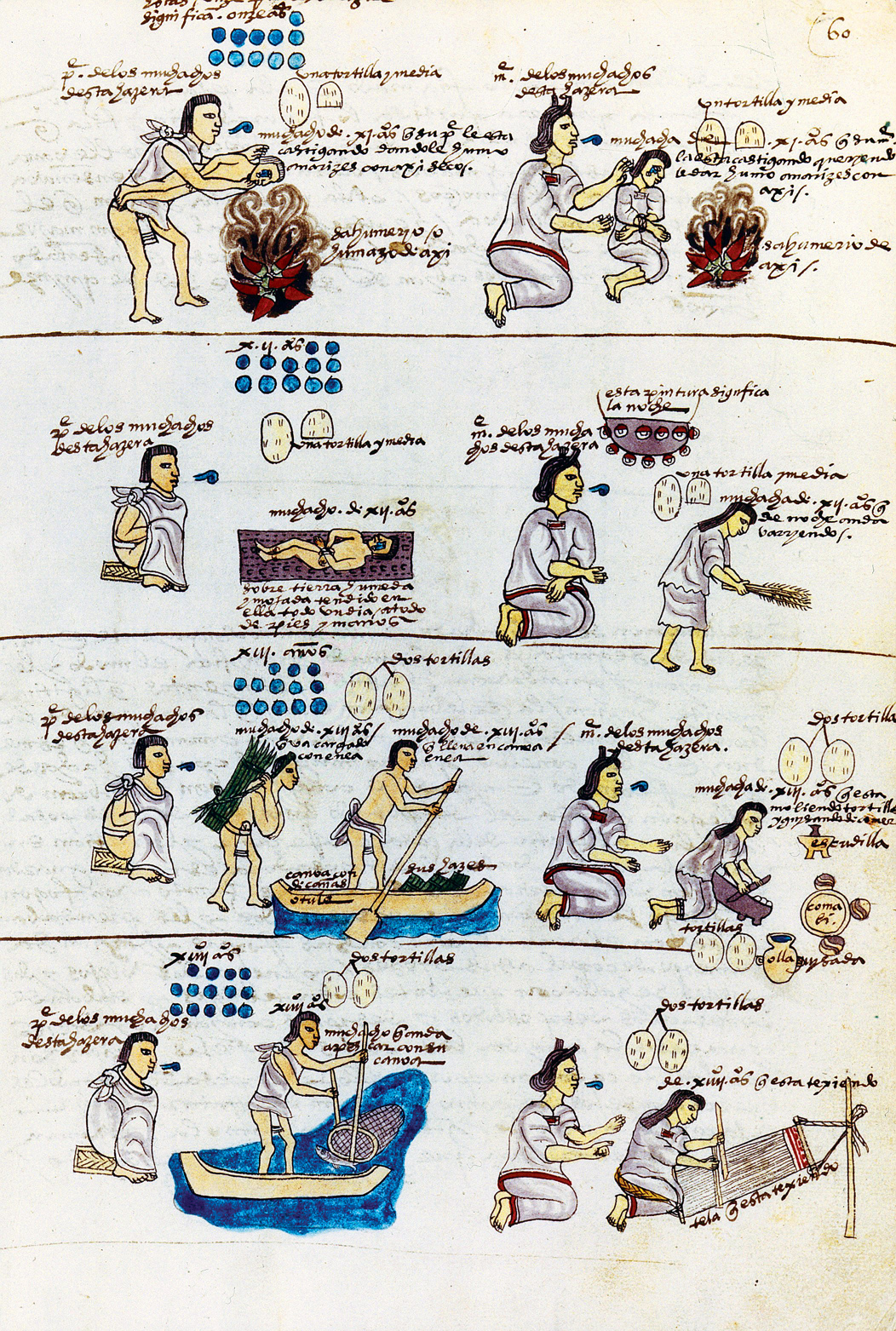
Aztec children being trained and punished, from the Codex Mendoza, early 1540s. Bodleian Library, Oxford, United Kingdom.
What was wonderful was his evident excitement. The feeling was communicable, and after two years in his history class I was hooked on whatever it was that he was smoking.
Andrew Delbanco remarks the same response from students at Columbia University in the 1960s lucky enough to hear the art historian Meyer Schapiro expound at length, with “glowing eyes and transported smile,” on the life forms in the paintings of Paul Cézanne and Wassily Kandinsky.
The discussions in the newspapers about the sorrows of American education assume the existence of what the editorial writers like to call “the educated citizen.” Possibly because I’ve never met the lady or the gentleman in question, even the idea of such a thing as an educated citizen strikes me as preposterous. I can conceive of a self-educating citizen eligible for induction into Henry David Thoreau’s Society for the Diffusion of Useful Ignorance, and I’ve had the good fortune to meet a number of people who can be so described. Without exception they possess the valor of their imagination, conceiving of an education neither as a blessed state of being comparable to membership in the Century Club nor as a luxury good tagged at $46,000 per annum in the show windows on Harvard Square. If in sixteen years they’ve spent fifteen thousand hours in a classroom (roughly the equivalent of twenty months), they expect to spend another fifty or sixty years revising the list of exam questions, knowing, as did T.H. White, that learning “is the only thing that never fails... the only thing which the mind can never exhaust, never alienate, never be tortured by, never fear or distrust, and never dream of regretting.”
From time to time in the scholarly journals and the alumni magazines I come across articles that might as well be entitled “What in God’s Name Are the Humanities, and Why Are They of Any Use to Us Here in the Bright Blue Technological Wonder of the Twenty-First Century?” The question suggests that within the circles of informed academic opinion the authorities construe the humanities as exquisite ornaments, meant to be preserved, together with the banknotes and the jewels, in the vaults of the university’s endowment—an acquaintance with the liberal arts one of those proper appearances that must be kept up, together with the house in Southampton and the season’s subscription to the Metropolitan Opera. Apparently content to believe that man’s machines have vanquished nature, subjugated the tribes of Paleolithic instinct, and put an end to history, the oracles in residence walk to and fro among the old trees sold to the alumni as naming opportunities, speaking of tenure and tables of organization, of Rembrandt’s drawings and Shakespeare’s plays as pheasants under glass. Their piety recalls the lines of Archibald MacLeish:
Freedom that was a thing to use
They made a thing to save
And staked it in and fenced it round
Like a dead man’s grave.
To bury the humanities in the tombs of precious marble is to fail the quiz on what constitutes a decent American education. Like the sorcerer’s apprentice, our technologists produce continuously improved means toward increasingly ill-defined ends; we have acquired a great many new weapons and information systems, but we don’t know at what or at whom to point the digital enhancements. Unless the executive sciences look for advice and consent to the senate of the humanities, we stand a better than even chance of murdering ourselves with our own toys. Not to do so is to make a mistake that is both stupid and ahistorical.
Beyond anything else they could imagine the ancient Greeks admired what Sophocles called the glittering play of “wind-swift thought.” Pericles in his funeral oration boasted not of the weapons or the works of art collected in the city, although these were many and beautiful, but of the character of the Athenian citizen—self-reliant, resourceful, public-spirited, marked by “refinement without extravagance and knowledge without effeminacy.” The term humanist appears in the Italian Renaissance, coined by scholars who rejoiced in both the pride of mind and the pleasures of the flesh. Correctly understood, the humanist ideal connotes ambition tempered with irony, embraces feats of courage as heroic as those to be seen on the playing fields at Ohio State. Humanism is the passion of thought and the will to understand: the voyage of Odysseus, great-hearted and wide-wandering; Charles Darwin sailing for the Galápagos and Fyodor Dostoevsky in trouble with the police; the Marquis de Condorcet hunted by the agents of the guillotine, at bay in a Paris garret writing his outline of human progress so that he might awaken mankind to the chance of its possible perfection; Mr. Mulholland at the blackboard in San Francisco, up against Hannibal’s elephants and Cleopatra’s barge, defending the frontiers of the American republic with a badly wounded piece of chalk.
